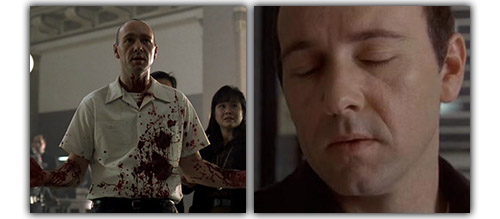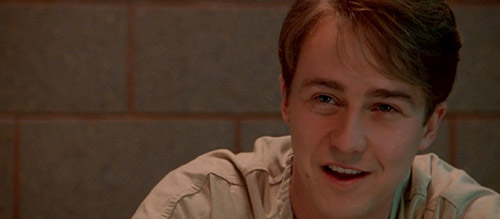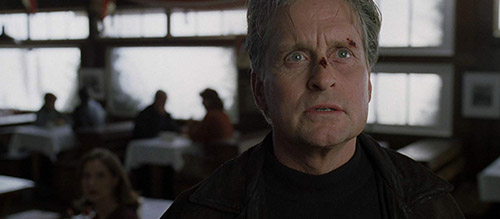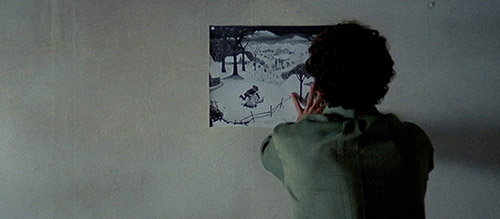Plot Reveals vs Plot Twists – When They Work and When They Don’t
I watched David Fincher’s film The Game (1997) recently. The story revolves around Michael Douglas’ character being pursued in a deadly ‘game’ by an organisation with seemingly limitless resources and an uncanny ability to predict his every move. The ending to the film got me thinking of one of my favourite (or least favourite) subjects in narrative, the plot twist. As with most things, I don’t claim to be the authority on the subject – or, in this instance, narrative structures in film; or in devices in literature – so the following will simply be an examination of when I feel it works and when, unfortunately, it doesn’t.
Because of the nature of this discussion, there will be spoilers. You’ve been warned.
Firstly, let me set out my brief criteria for what constitutes a plot twist…
I believe there to be a difference between a ‘twist’ and a ‘reveal’. A ‘reveal’ is simply a revelation, a new piece of information that affects the direction of the narrative for the characters from that point on. A ‘twist’, by contrast, is a realisation that the past now has to be reconstructed in a different manner, that what we’ve been witnessing hasn’t necessarily been the truth.
For ease of understanding with two fairly well known films so as to avoid breaking people’s hearts for accidentally revealing the twists, we’ll use Seven (1995) and The Usual Suspects (1996).
The reveal of Spacey’s character as the bad guy in Seven is a ‘reveal’, since it dramatically disrupts the characters’ paths, but only from that point on as everything they know beforehand still stands (this being that there’s a serial killer killing people in the theme of the seven deadly sins). Despite the shocking, abrupt turn in the plot, this revelation is one that informs the rest of the narrative and doesn’t disrupt what has already happened. In The Usual Suspects, however, the same revelation of who the antagonist is this time changes our entire understanding of the events described thus far, in that all of the narrative has been fabricated.
It seems to me that there is a tendency to get these two points confused, possibly because we use the term ‘plot twist’ to encompass both of these devices when they are often completely different. One changes our expectations, whereas the other changes our inherent understanding.
Let me take Primal Fear (1998) as another example, because this film has both devices.
Halfway through the film, Edward Norton’s character suddenly flips out, and we have the ‘reveal’ that he has an alternate personality. However, at the end of the film, when he lets us know that this ‘second’ personality was the only one to ever exist, and that the original persona was a facade, we change the way we understand every single action up to that point. We come to understand the true motivations of the character, and how we (and everyone else in the story) have been carefully manipulated.
The reason why some twists feel false is because a good twist should be possible to detect – it’s right under your nose, if only you’re quick enough and smart enough to piece together the clues.
These two points (that it changes our understanding, and that the audience should have in some way been presented, even if subtly, with the correct information), must be handled with skill, ingenuity and creativity, and have to tick their respective boxes in order to work.
This is why we don’t usually classify the Agatha Christie style reveal of the killer as a plot twist, even though there has been a series of clues from which we could, technically, make the same leaps as Poirot does. The difference here is that we always knew there was a killer, so it’s simply a matter of pointing the finger in the right direction to reveal them. Of course, there are some exceptions, such as in Murder on the Orient Express (originally published in 1934), as this operates as both a reveal and a plot twist. Here, we have been operating under the assumption that there are only one or two killers, and consequently our understanding has been moulded by this assumption. The fact that everyone is the killer, and that nobody is innocent, reshapes our entire understanding of the narrative, therefore making the killer’s ‘unmasking’ both a reveal and a plot twist.
These are very subtle distinctions between the two devices, I’ll grant you, and it is possible for them to be combined into a single moment as I’ve just referenced, but these distinctions do fundamentally remain between twists and reveals nonetheless.
When reveals are passed off as plot twists, you have the reaction that you’re being taken for a ride. The twist seems to have been forced upon you, and you feel angry because there’s no way you could have possibly predicted it.
Let me present it to you as a hypothetical situation.
In the third film of a franchise, an antagonist killed off in the first is revealed to have been alive all the time (no this isn’t The Rise of Skywalker (2019)). There are, in my mind, three realistic ways you could go about this…
1) Just reveal they are still alive, without them having been a mastermind behind the scenes.
2) Have them appear out of the blue and reveal they were pulling the strings.
3) Have the reveal outline all the little clues the characters and the audience missed throughout the previous films.
Category number 1 would be classified as a straight reveal. ‘I’m back’, plain and simple; we get a brief shock or surprise, and we move on with the story.
Category number 3 would be an example of a satisfying plot twist. We understand and see malevolence throughout the film; we understand exactly how we have been manipulated and fooled, and how, if we had been just a little bit smarter, we could have seen it coming. We have the satisfaction of seeing how everything makes sense, followed by the fun of rewriting the story in our heads.
Category number 2, however, is the scourge of films everywhere, and these are what I and many others get angry about, and subsequently rant about, on the internet.
Never let these little gremlins of writing anywhere near your films. These little fellows try to pass themselves off as being incredibly complex ‘gotcha’ moments, wearing smug little banners around their necks that read ‘aren’t I clever?’, when in reality there is no possible way that you should have been able to guess that the twist was coming. The writers force these moments in to try and liven up an ending when they have no better way to wrap the story up nicely and coherently. The audience is not involved, they haven’t been drawn in, and as a result you get a feeling of ‘oh, ok,’ rather than, ‘oh, oooooh, so that meant that and therefore that’s why that happened like that and, oh that’s good, I should have seen that coming, that all makes sense…’ as you reconstruct the narrative again.
Never let yourself be fooled by these remnants of egotistical men and women hiding under a pretence of being clever writers and weavers of great yarns.
To return to The Game…
The final, ultimate reveal that it was all an elaborate birthday party present is hollow because, well really, how in any universe were we meant to guess that? Even as a reveal it’s pretty bad because we’ve been treated to so many false-endings before that we just want the thing to end, and any answer they give could be logical. It would be much better to just have the whole thing remain a complete mystery than explain it in a contrived way that attempts to make you laugh as if you’ve been punched one final time from a place you didn’t expect.
Having watch Unbreakable (2000) for the first time the other day (I’m not a massive Shyamalan person), I found the final reveal of Elijah being the mastermind behind the accidents to be hollow, because it pretends to change the narrative when in fact it only changes the character. This could be argued out until empires rise and fall, but I believe that it simply reveals Elijah’s true nature, and nothing else about the narrative. Bruce Willis’ character still undergoes the same arc, which is the heart of the narrative. Elijah’s intentions are still the same, to bring out the superhero qualities in Bruce Willis. Elijah isn’t a mastermind, but simply a sociopath, and that the reveal constitutes of entirely new footage (and nothing relating to anything we have seen before) suggests that we weren’t meant to be able to anticipate the change. In fact, the story still works perfectly well without this final reveal because, as mentioned, Willis’ arc is still intact. Following my criteria, this final scene does not, and should not, be classified as a satisfying plot twist.
For me, the best plot twist of all time is found in Dario Argento’s debut feature, The Bird with the Crystal Plumage (1971). As a giallo, you know there’s going to be a monumental reveal somewhere, but the reveal of just what the protagonist is trying to recall is perfect. The protagonist, at the beginning of the film, has seen a man in a long black coat and hat trying to stab a woman in a closed shop one night, before she breaks free and the man runs away. The twist is that it is in fact the other way around. When the two of them were struggling for the knife, it wasn’t through her attempt to get him to release the knife, it was a struggle from him to stop her from stabbing him, and therefore the man running away was running for his life and not running away from the police. We’re shown the scene in flashbacks a few times throughout the film, so we have all the evidence we technically need, and we know it’s here because the protagonist maintains he missed something in what he saw. Then the twist is revealed, and where once we were hunting a man, now we’ve met the killer herself several times, and our understanding of this key event suddenly shifts everything 180 degrees.
It is such a simple but well constructed moment that sticks with me due to its playing on preconceived truths and expectations. That’s how you do a twist. Exactly like that. Please film writers, learn from this, and let’s have great moments of realisation and understanding instead of people shouting at the screen going ‘Come on! How on earth were we meant to get that?’






Great work! I was gonna write an essay about movie twists and an article like this was exactly what I needed.